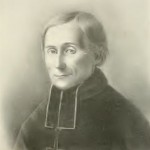On this day, November 5, 1834, at 5:00 P.M., newly consecrated Bishop Simon Gabriel Brute took possession of his Cathedral in Vincennes. He celebrated pontifically for the first time on the following Sunday, November 9, 1834. 1 This was the end of a long journey to Saint Louis, and the pomp of the consecration of a Bishop, and then the long ride to Vincennes on horseback to take possession of his Cathedral and his new Diocese.
When Brute was nominated as bishop, many thought that he was too scholastic, unprepared for the rigors of life in the wilderness of Indiana. Of course, Brute proved everyone wrong and in the short five years that he was Bishop of Vincennes, he made great strides in promoting Catholicism on the ‘frontier’. For all those reasons he is no longer known only as Bishop Brute, but as Servant of God Simon Brute
In Charles Blanchard’s History of the Catholic Church In Indiana (Vol-1) he writes of Brutés arrival in Vincennes:
As if impatient to begin his labors in his new diocese, Bishop Brute, in company with Bishops Flaget and Purcell, left St. Louis the following Monday after his consecration, November 3, and journeyed on horseback to his future home, arriving at Vincennes November 5, 1834. Mr. Cauthorn, in his history of St. Francis Xavier’s cathedral, says that the coming of their new bishop had become known to many of the citizens of Vincennes, and a large number of people of all denominations crossed the Wabash river to meet the approaching prelates and escort them into the town.
The installation of the new bishop took place in the cathedral that evening, and the sermon was preached by Bishop Purcell to a congregation which completely filled the sacred edifice. The remainder of the week, continues Mr. Cauthorn, was devoted to religious exercises in the church. Many clergymen from a distance were in attendance, including Fathers Abel, Hitzelberger and Petit, who were all able, learned and eloquent men. Two services were held each day in the church, one at ten o’clock in the morning, and another at six o’clock in the evening, at which sermons were preached in French and English. On Sunday, at ten o’clock. Bishop Brute for the first time officiated pontifically in his cathedral, and Bishop Flaget addressed a large congregation in French. Vesper services were held at 6 o’clock in the evening, and Bishop Purcell delivered a sermon in English. Almost the entire population of the town attended all these services.
On the following Monday the visiting prelates and clergymen left for their respective homes, and Bishop Brute found himself literally alone in his wild and thinly settled diocese. And it was from this moment on, during the time he was bishop of the diocese, that he gave evidence of and developed, contrary to all expectations based on human reasoning, the wisdom and peculiar fitness of his selection as bishop of the new diocese.
When Bishop Brute came to Vincennes in 1834, it was a very small and poorly built town. The cathedral was situated in the most populous part; but there was not (excepting the cathedral and the small pastoral residence) a single brick dwelling in all that part of the town. The houses were mostly built of logs and plastered over with adobe, of a uniform size and appearance, being only one story’ high, with a small porch in front, and generally whitewashed. He had in all his extensive diocese but three priests, and two of these were stationed at a distance of not less than 200 miles from him, and the third, Rev. Lalumiere, who was the first priest ordained specially for the diocese, was stationed some thirty miles distant. The cathedral was wholly unfinished, being no more than the four bare walls, unplastered, and the eight large square timbers supporting the roof were entirely bare, with no sanctuary or any kind of ornamentation. It presented a very desolate appearance. The entire revenues of the church did not amount to over $300 per annum, and the most of this was paid in produce. The $200 donated him by the Sisters of Charity, when he was appointed bishop, had been necessarily spent in his travels before he reached his diocese; and the revenues at his command were nothing compared with the needs and demands of the diocese. The outlook, it must be admitted, was anything but encouraging, and sufficient to dampen the zeal of any ordinary man. But Bishop Brute, student and recluse as he had previously been all his life, did not repine, but at once commenced to perform the work that had been assigned him. 2
